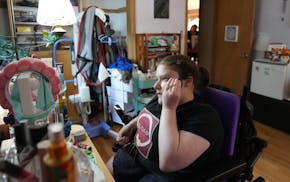FBI raids at autism programs. Stories of fraud in housing assistance services. Federal investigators digging into "kickbacks" by addiction treatment providers.
Concerns about providers abusing taxpayer dollars and offering low-quality services — or, in some cases, no services at all — triggered Minnesota leaders to impose new regulations and oversight on several fast-growing programs serving vulnerable adults and children.
"A lot of what we tried to do this year was address those holes in the system that people were able to utilize to commit fraud," said House Human Services Finance and Policy Co-Chair Joe Schomacker, R-Luverne, while adding training and resources so that people trying to provide good care are "not caught up in the middle of this."
Preventing fraud was a top priority for many lawmakers in the recent legislative session after Minnesota saw the nation's largest pandemic-era fraud with the Feeding Our Future case.
Legislators agreed to allow government agencies to share data about suspected fraud and temporarily withhold program payments if there is evidence of fraud, but many of the broad changes they proposed did not pass. They did not add an Office of Inspector General, expand the Office of the Legislative Auditor's special review unit or bolster the size of the attorney general's Medicaid fraud-fighting team.
However, state leaders did approve targeted measures aimed at troubled human services programs.
"Fraud in public services ultimately hurts the people we are meant to help," temporary Human Services Commissioner Shireen Gandhi said in a statement, adding that steps taken by Gov. Tim Walz and legislators give the department more authority to detect, prevent and take action against fraud.
Here are key changes:
Autism provider licensing
Reforms to a program supporting young people with autism spectrum disorder and their families were front of mind when legislators started work in St. Paul this January. Just a month before, the FBI raided two autism centers that had received millions through the Early Intensive Developmental and Behavioral Intervention (EIDBI) benefit.
Investigators have been looking into Medicaid fraud in the EIDBI program as the number of recipients and providers getting the dollars has shot up in recent years. The high demand for autism-related services has contributed to the sharp rise in the program's use, state officials have said, but also noted that more guardrails are needed to ensure adequate care.
As of this month, Department of Human Services officials said they have 85 open investigations into providers and 18 closed cases.
Unlike many other social service providers, such as child care companies, the state did not license the EIDBI providers and they are not regularly inspected.
Lawmakers required the state to start issuing provisional licenses to providers next year and the human services commissioner must propose comprehensive licensing standards for the program by January 2027. Legislators also put a temporary moratorium on licensing new providers, expanded background checks and added required clinical supervision and standards.
Even before the legislative changes, the DHS bolstered oversight this month by raising its screening level for the providers to "high-risk."
Any new organization applying to offer the autism intervention services, as well as those that are re-enrolling or changing ownership, will go through a more rigorous screening process. They will also be subject to unannounced site visits and fingerprint background studies for owners, DHS officials said.
Housing stabilization oversight
The state is also adding the high-risk measures for providers of Housing Stabilization Services, another unlicensed Medicaid-funded program that has landed in the spotlight amid stories of bad actors.
The program, which has been around for about five years, helps low-income people with disabilities and seniors find and maintain housing. Like the early autism intervention program, it has seen enrollees and providers — many of them for-profit companies — skyrocket.
Housing advocacy groups and providers cite numerous problems with the program, from structural troubles with the funding system, to long wait times for the DHS to process applications, to insufficient training for workers. They also shared stories of people preying on those in need by signing them up for the benefit and not providing services. Former employees at a couple of providers have also raised billing concerns.
Lawmakers added numerous requirements for housing stabilization agencies, from documenting service delivery to compliance training for owners and supervisory employees to limits on services provided — such as a limit of 100 hours annually per recipient for housing transition services.
Starting this July, the DHS must do risk assessments before enrolling a housing stabilization service agency and look into their history of performing such services, their financial information and internal controls, compliance with government requirements and other measures.
Preventing kickbacks
Legislators took steps to prevent kickbacks in human services programs. Federal Medicaid law prohibits kickbacks, but there has not been a similar ban in state law.
Lawmakers imposed criminal penalties for intentionally offering, paying, soliciting or receiving money or other things of value in return for referrals or for getting goods or services payable under a federal health care program.
New penalties come amid concerns about kickbacks at addiction treatment providers. Last year the FBI raided Evergreen Recovery in St. Paul, with investigators saying the organization used illegal kickbacks and committed Medicaid fraud by enticing people with free housing and billing Medicaid for treatment.
Many other treatment providers have offered housing subsidies, including the massive provider Nuway. Earlier this year, the DHS stopped Medicaid payments to Nuway for its program offering outpatient addiction treatment with monthly housing subsidies. The department noted a U.S. Department of Justice investigation into the provider and a "credible allegation of fraud."
Nuway also ran into problems with its billing practices. Legislators added regulations this session for providers submitting time-based claims to prohibit duplicative billing.
State leaders also approved an anti-kickback law for the child care assistance program (CCAP), which helps low-income families afford care.
They prohibited people from offering or receiving incentives, like money or services, in exchange for getting CCAP benefits or for directing those benefits to a particular provider. There are some exceptions, like promotional offers that benefit a family going to a certain provider. Lawmakers also specified that it's illegal to try to buy or sell an unauthorized person access to a family's child care subsidy benefits.
Things to know about the retrial of Karen Read in the killing of her police officer boyfriend
Gov. Tim Walz tries to thread the needle on immigration, an issue that's divided his party

Minnesotans with disabilities feared state balancing budget "on our backs." Here's what happened.

Foundation submitted voter registration applications with fake IDs, charges say

